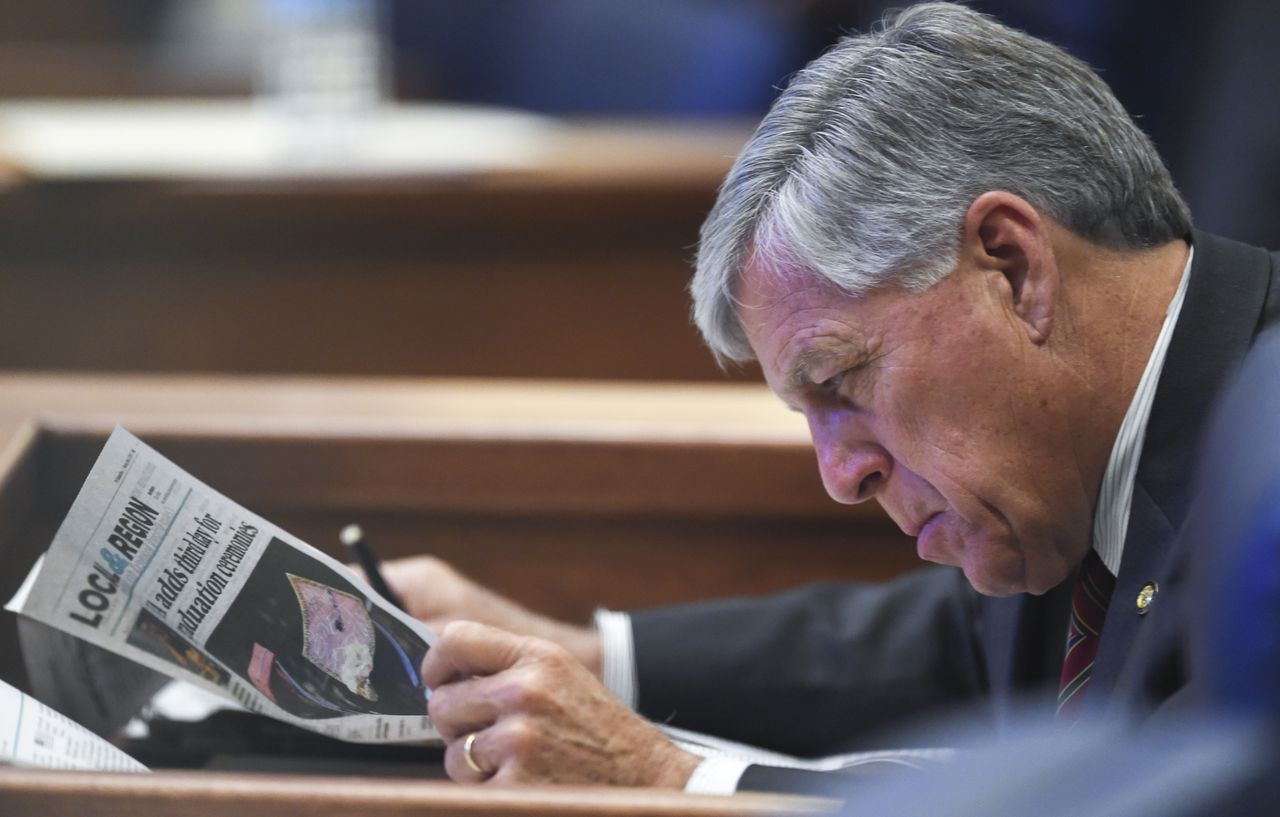Alabama lawmakerâs dumbest idea is now mainstream American politics
This is an opinion column.
For nearly 30 years, state Sen. Gerald Allen has been a flagbearer for stupid in the Alabama Legislature.
Just a few years ago, the Republican lawmaker from Cottondale sponsored a bill to rename a Tuscaloosa street after Crimson Tide football coach Nick Saban. The only trouble was, that the street was named already for a Tuscaloosa police officer killed in the line of duty.
Allen had reason to care for such things. He was, after all, the sponsor of Alabama’s monuments bill, which applies to memorial streets and buildings, not just Confederate lawn ornaments in the public square.
It should be noted: The officer who died was Black.
The bill was one of many such blunders and embarrassments.
Allen has tried every which way he can to legalize guns in just about every public space (except the Alabama State House) and would mandate the national anthem be sung weekly in schools.
Allen has sponsored legislation to teach about Christmas and Hanukkah in schools, but not other religions’ holidays. When Sharia law was the conspiracists’ boogeyman, he fought to outlaw it, whatever it was.
For 20 years, he has been a guidepost in the Alabama Legislature that his Republican colleagues understood to mean as the red line — how far was too far.
It was a reputation Allen earned early, with a bill that seemed over the cliff’s edge.
At least back then.
In 2004, Allen introduced legislation to pull books with LGBTQ characters, themes and authors from school libraries, and it was this bill that set the tone for his political career.
When asked what should be done with the books, Allen said he didn’t think they should be burned, necessarily.
“I guess we dig a big hole and dump them in and bury them,” he said at the time.
Friends had to quietly explain that Allen’s bill would ban, along with works such as “Cat on a Hot Tin Roof” and “The Color Purple,” a little best-seller called “The Holy Bible.”
The bill attracted attention from national and international press. Newspapers overseas pointed and gawked at the would-be Alabama book-banner.
Like much of Allen’s proposed legislation, that bill died a quiet death in committee.
Back then, Alabama lawmakers understood such legislation to be dumb and extremist.
Today, something bizarre is happening. Allen’s approach to life and literature is popping up everywhere, maybe at a library near you.
Last week — during Banned Book Week, of all times — Gov. Kay Ivey wrote a letter to the Alabama Public Library Service threatening to withhold state funding.
This comes after Ivey fired the head of the state’s Pre-K program, Barbara Cooper, for using nationally recognized and accepted training manuals. Those texts, which were not school books for children, encouraged Pre-K educators to be mindful that children come from diverse backgrounds and should be made to feel welcome in the classroom, regardless.
It didn’t matter that Cooper had the books pulled after a state lawmaker complained, Ivey fired her, anyway, and castigated her on the way out.
“Woke concepts that have zero to do with a proper education and that are divisive at the core have no place in Alabama classrooms at any age level, let alone with our youngest learners,” Ivey said then.
Her administration didn’t bother to dig a hole, as Allen once suggested. Instead, they threw the texts, which cost thousands of dollars, in a dumpster.
But Ivey isn’t the only official taking up this crusade. This sort of thing is happening all over today, and libraries have been put on the defensive in the culture wars.
The Huntsville-Madison County Public Library opted to proactively surrender by reviewing books to pull from its children’s sections. Those texts included one picture book, “Read Me a Story, Stella,” flagged not because it featured LGBTQ characters, themes or authors, but because the author’s last name was “Gay.”
Not even Allen ever went so far.
And Alabama GOP Chairman John Wahl — who also serves on the Alabama Public Library Service Board when he’s not voting with a photo ID he made himself — wants to reshape the state’s obscenity law to target librarians.
But this sort of thing isn’t confined to Alabama. In state houses and library board meetings, across the country, Allen’s crazy-uncle politics don’t seem marginal anymore.
They’ve infiltrated the American mainstream.
This is how far we’ve regressed.
Twenty years ago, Gerald Allen was living in the past. But as American politics rolls backward, he looks more and more like a man ahead of his time.
